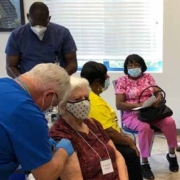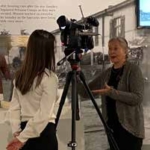Some COVID lessons are worth keeping

Jeff lytle
We remember plenty of bad experiences with the pandemic, but there are some rays of light – some practices we should keep doing now.
For example, I believe avoiding indoor crowds of strangers still makes sense.
It makes sense to cover your nose or mouth when sneezing or coughing or stay home. The pandemic taught us how hyper-wary others can be of a hint of illness.
We should continue new outdoor exercise habits. Indoor workouts of a different kind, team-building jigsaw puzzles, make social sense too.
That’s just me.
Survey some local civic leaders and really good ideas come out.
Michael Dalby, president and CEO of the Greater Naples Chamber, thinks big. “I’d like to see the level of regionally localized communication and local awareness continue.”
With shortages of child care and housing, for example, Dalby says it was “imperative to communicate what’s going on, what’s working and what’s not.
“We aren’t a bunch of unassociated island communities.”
Leslie Lascheid, CEO of the Neighborhood Health Clinic, wants to extend lessons learned. “If it was the importance of washing one’s hands or how germs spread, we became more aware as a community on all aspects of protecting oneself,” she says. “We understood the importance of personal protective equipment like gowns, masks, and gloves … to protect both the patient and the physician, nurse or other health care individual.” “Today, the clinic has been fortunate to have a higher number of patients requesting the flu vaccine,” she relates. “We have more educational opportunities with our patients, better arming them with the tools to manage their chronic conditions and have a more complete life.”
Mike Reagen, a past chamber president/CEO, points to science. “Amidst the most virulent pandemic in 102 years, I was shocked by the numbers of misled folks who followed those trashing scienceNOW embrace polarizing, divisive acts,” he says. “The result: sadly, thousands of unnecessary deaths.”
Even Paul Beirnes, Collier County’s director of tourism, sees Links between then and now, citing the importance of “being nimble while closely monitoring market conditions and research with the proactive readiness to make rapid changes as necessary.” “These operational lessons will remain paramount for any business going forward,” he says, “as market conditions and operational obstructions seem to emerge at warp speed.”
Jackie Faffer, president and CEO of the Baker Senior Center Naples, said she looks forward to using online or virtual Zoom tools, which were godsends during the pandemic, to stay in touch with seniors who leave the local area for the summer.
The new and improved senior center in North Naples, she notes, has plenty of that technology built in. Still, Faffer adds, she wants to be careful to balance the Zooming with the center’s traditional up close and personal, caring attention to combat members’ feelings of isolation.
A hallmark of that is the weekly Wednesday lunch, which has doubled to 300, even while respecting social distancing. “It’s a big room,” Faffer observes.
Other pandemic holdovers will include providing further vaccinations and boosters as needed and safeguarding cleanliness with a state-of-the-art air purification system and room-sanitizing robot.
Ilia Echevarria, NCH chief nursing officer and executive director of the NCH COVID Response Team, reports NCH follows CDC guidelines on preventive measures such as vaccines, handwashing, masks and physical distancing, as well as their recommended strategies of what to do if you suspect you may have COVID.
“Other than that, there has not been one magic bullet that rises above the rest in offering protection –except for the masks, which everyone loves to hate,” Echevarria says, though adding: “It was strict adherence to our masking policy at our facilities that prevented any of our employees – zero — from catching COVID from our patients (or vice versa). That’s a distinction not too manyother hospitals around the country can make.”
Rick LoCastro, Collier County commissioner and former hospital administrator, offers a fundamental view. “Staying in good health, connected with your personal physician, and monitoring your personal symptoms is all I recommend,” says LoCastro. “Those who feel they are high risk can always proceed with caution …”
Mike Lyster, president of the Collier Citizens Council, sees good and bad. “The very best thing the county did was administer the vaccine program,” he says. “The next best thing, by the school system, was to get the students back to learning as rapidly as possible, although remotely, and then offering several options for learning when the Fall 2020 session began.”
Lyster adds: “I believe that the medical community did its job but the decision-makers placed entirely too much weight on those recommendations at the expense of our students, mental health and in some cases physical well-being (senior citizen shut-ins especially). There should have been broader assessments of impacts and more individual freedom allowed.”




Leave a Reply
Want to join the discussion?Feel free to contribute!